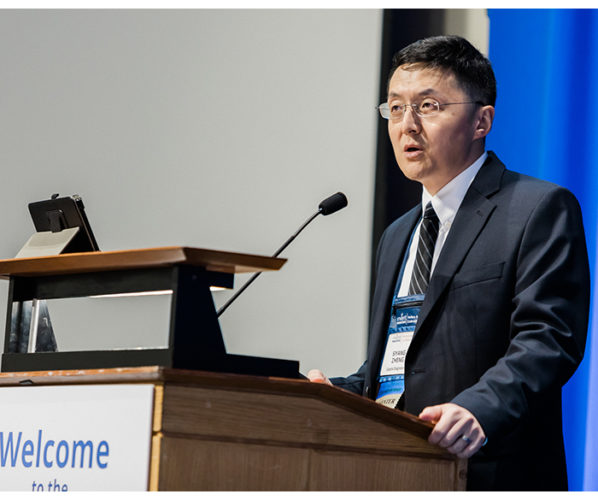Success Story
“As an engineer, translating the lab-produced technology and providing great value to the people/patients who are in need of those products/services will be the ultimate satisfaction”
Dr. Siyang Zheng
Penn State Associate Professor and Captis Diagnostics Founder
Penn State Startup Captis Diagnostics Focuses on Early Cancer Diagnosis and Precision Cancer Treatment
Rational and precision cancer treatment requires accurate cancer diagnosis at the molecular level. This is often achieved by tumor tissue biopsy from the cancer patient. However, conventional tissue biopsy is a painful, risky and expensive process. Oftentimes the cancerous tissue is limited or unobtainable. Therefore, new low-cost and noninvasive sampling, and sensitive and specific cancer biomarker screening methods are urgently needed for early detection and targeted cancer therapy.
Early Cancer diagnosis results in significantly higher patient survival compared to late stage diagnosis. Cancer-derived EVs hold a great promise to serve as biomarkers for early detection of cancer. Additionally, diagnostic methods that provide clinically actionable biomarkers are essential for precision cancer treatment. Penn State Startup Captis Diagnostics will provide valuable tools to academic and industry researchers to advance biomarker discovery, diagnostic development and targeted therapies. In the long term, Captis will offer simple non-invasive and repeatable clinical blood tests that she light on the best course of diagnosis and treatment for cancer patients, using an approach commonly referred to as liquid biopsy.
Specifically, they are developing proprietary non-invasive diagnostic tools for real-time cancer biomarkers such as extracellular vesicles (EVs). EVs offer advantage in cancer diagnosis compared with conventional cancer diagnosis through painful and invasive surgical tissue biopsy. Notably, liquid biopsy technology was selected as on of 10 breakthrough technologies in 2015 in MIT Technology review.
The research behind Captis Diagnostic’s technology was funded by the Fund for Innovation and the College of Engineering’s ENGINE grant. In 2016, Penn State Associate Professor Dr. Siyang Zheng was awarded the grant, which matches one dollar for every two dollars provided by the college, up to a maximum $75,000 total investment per project. “The Fund for Innovation grant we received and the ENGINE grant from my college gave us additional resources to further developed the technology toward the commercialization. It is a necessary step between research and company formation for commercialization,” says Dr. Zheng
Captis will introduce its platform technology-based products and services for both research and clinical diagnosis based on its own proprietary technology, including:
- EV Isolation Kit, designed for use by academic and industry EVE researchers.
- EV Lung Cancer Targeted Therapy Kit, for patients with EGFR T790M mutation or EML4-ALK fusion, to ensure patients are being treated with the most effective targeted therapy for their specific DNA mutations (research & clinical diagnosis).
- EV Lung Cancer Diagnosis Kit, designed for both research and clinical diagnosis.
- EV Pancreatic Cancer Diagnosis Kit, for both research and clinical diagnosis.
Founding a startup is challenging but Invent Penn State is making it easier for researchers to turn their research into a viable business. “Launching a startup is becoming more realistic with the support from Penn State. It is a great venture,” says Dr. Zheng. “As an engineer, translating the lab-produced technology and providing great value to the people/patients who are in need of those products/services will be the ultimate satisfaction.”
Captis Diagnostics has one issued US patent, two pending US patents, and one issued China patent. It’s important to protect IP and the Captis has been aggressive in technology development and IP filing with the assistance of the Penn State Office of Technology Management.






